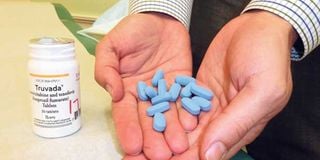Don’t relent in the fight against HIV/Aids

Truvada, the first pill recommended for HIV prevention in healthy people.
The global community has been commemorating World Aids Day on December 1 every year since 1988. This year’s theme is “Global solidarity shared responsibility”.
The theme has been inspired by the unprecedented global health challenge occasioned by the Covid-19 pandemic, which has brutally succeeded in highlighting the gaps in global healthcare systems and how this has had a far-reaching impact on other spheres of human life.
The pandemic threatens to undo the past gains achieved in the response against Aids. This is aptly illustrated by the recent UNAids report, which projected that the deadly scourge could spark 123,000 to 293,000 new HIV infections and 69 ,000 to 148 ,00 Aids-related mortalities between 2020 and 2022.
While Aids and Covid-19 are both zoonotic diseases caused by viruses that spilled over from chimpanzee and bat to humans, respectively, the former remains not only one of the world’s most serious public health threats, but also a development problem.
With over 30 million recorded deaths and neither a vaccine nor effective cure in sight yet, Aids has earned a notorious distinction as the most catastrophic infectious disease of all time.
One of the outstanding hallmarks of Aids is the decline of the body’s immune capacity, thereby increasing the susceptibility of people living with HIV to opportunistic infections.
It has been shown that Covid-19 can result in serious illness with severe outcome in people grappling with other conditions that compromise their immune system, such as Aids. Therefore, as Covid-19 infections and deaths continue to spiral upwards in the country, people living with HIV must take utmost personal care to keep the novel coronavirus at bay.
They should be encouraged to avail themselves of the opportunity of being tested should they experience symptoms associated with Covid-19. Authorities need to ensure there is uninterrupted care for these people by steadying provision of essential HIV services, including supply of life-saving medicines, such as antiretroviral therapy (ART).
Further, it’s vital to equip frontline medical workers, who take care of people living with HIV with the necessary protective equipment.
If the safety of people living with HIV is achieved amid the pandemic, sustained efforts should be geared towards the ultimate global mission to end new HIV infections and Aids-related deaths by 2030.
This calls for strong advocacy to ensure fair access to essential HIV services, such as HIV prevention, testing, treatment and care.
On a broader scale, there is a need to invest in strong healthcare systems as championed by the Universal Health Coverage (UHC) to ensure people have equitable access to a whole array of quality healthcare services.
Ondara Zablon Kerima, Nairobi




